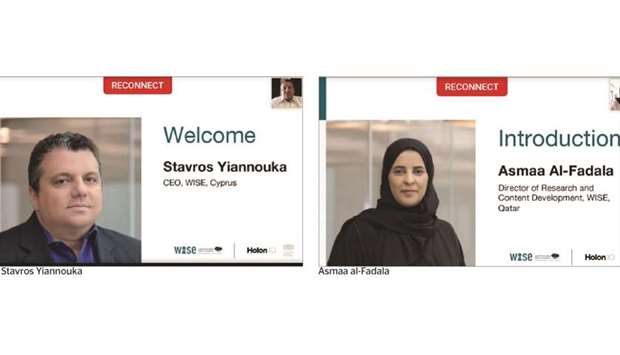World Innovation Summit for Education (WISE) a global think tank and an initiative of Qatar Foundation, will launch next month a publication on the impact of the Covid-19 pandemic on global education scenario.
“The first part of the e-publication ‘Education Disrupted; Education Reimagined’ will be thoughts and responses from the education frontline during the Covid-19 pandemic and beyond. More updates on the publication will be on the website in the coming days,” said, Asmaa al-Fadala, director of Research and Content Development, WISE.
She was addressing the opening session of the second part of Education Disrupted, Education Reimagined series organised by WISE. The event saw several luminaries in education as well as thought leaders present their experiences during Covid-19 as well as share their thoughts for the future of education during the pandemic and ahead.
“The present crisis has revealed several things for us. It has made us think about the central importance of well-being; social and emotional learning - the hidden curriculum in education. School is more than just an academic curriculum and this crisis is a great revealer of all these,” explained al-Fadala. The official also noted that the pandemic has again shown that global education systems are inherently unequal. “This crisis has highlighted that access to quality education is not equal. We need to use this crisis to finally bridge the gap of inequality in the education system,” she noted.
According to al-Fadala, education can and must be reimagined. “Never waste a good crisis was the buzz word during the first part of the forum in April as necessity is the mother of all inventions. This is the time to bring new ideas and innovate. It is imperative that we carry forward the lessons,” she continued. WISE CEO, Stavros Yiannouka, said in his opening remarks that governments are investing huge sums of money to fight against the pandemic and similar investments must be made in education too. “World governments have been spending billions to guard against Covid-19. We must do the same for education. Aspirations of quality education can be achieved only this way. We also need to develop education leaders and must understand the intrinsic motivation on the part of teachers, parents and learners to teach and learn. This is what drives the education ahead,” he highlighted.
Yiannouka maintained that there was an unprecedented learning loss during the months of the pandemic. “The data for the last three months are coming and we are seeing unprecedented learning loss an equivalents of years of productivity and future earnings of the students, especially those in the disadvantaged communities. With the growing pandemic, it is also feared that there could be more cuts on the budgets for education. This will be particularly devastating for the education of students in most vulnerable communities,” he added.

..

